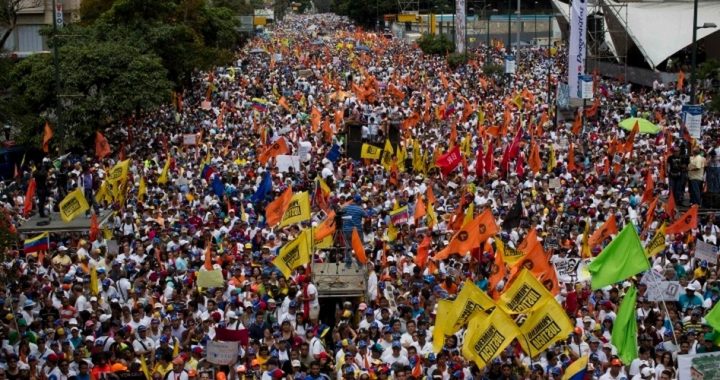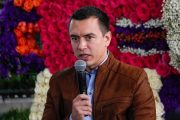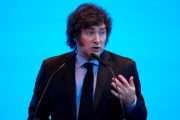
Despite a ferocious crackdown on beleaguered protesters by the socialist regime in Venezuela that has left at least 15 dead so far, demonstrations against totalitarianism and economic collapse across the nation are still growing. While “President” Nicolas Maduro, successor to the late socialist strongman Hugo Chávez, has secured the support of government workers and fellow autocrats in the region, analysts say the escalating uprising has the potential to ultimately bring down the Venezuelan regime — and possibly other tyrants in the region.
Facing worldwide criticism for arresting opposition leaders, killing student protesters, and deploying the military to suppress peaceful demonstrations, Maduro is engaged in a delicate balancing act to keep himself and his minions in power. On one hand, the autocratic ruler has increasingly resorted to brute force, violence, and terror to prevent the toppling of his regime, merely sparking more public outrage and greater protests. The regime also deployed warplanes to buzz over the demonstrations and terrorize critics.
At the same time, Maduro also tried to convene a “national peace conference” with opposition leaders and officials. The first meetings, which were supposed to include state and local officials, took place Monday. However, while a few politicians from outside political parties participated, neither of the opposition’s top leaders was in attendance. Leopoldo López, who helped organize the student demonstrations that morphed into a full-blown national uprising, was among those arrested by the regime on trumped-up charges.
Meanwhile, former opposition presidential candidate Henrique Capriles said he would not attend the meetings either. “I am not going to make Nicolas Maduro look good,” Capriles, currently the governor of the state of Miranda, was quoted as saying in media accounts about his decision not to participate in the conference. “That is what they want, that I go there as if the country was absolutely normal…. The only thing Maduro wanted was a handshake and a photo so he can tell the world that everything is OK.”
The opposition leader, who lost the last presidential race by a razor-thin margin in what countless experts called a fraudulent election, also said that attending the “peace” meeting sought by Maduro would look like an endorsement for the regime and its “repression” of peaceful protests. Finally, Capriles added, he will not participate in discussions while López and dozens of other high-level critics of the regime remain behind bars as political prisoners.
López’s wife, Lillian Tintori, has also so far rejected the deceitful “peace” efforts of the regime, which analysts and many protesters view as either a propaganda stunt or a last-ditch attempt to hold on to power as anti-regime demonstrations sweep across Venezuela. “Look at the statements from Nicolas Maduro, every time he speaks, he insults us, he speaks with aggression, speaks with hate,” Tintori was quoted as saying by the Associated Press after a press conference announcing an upcoming women’s march against Maduro.
As the streets of cities and towns across Venezuela were filling with countless outraged citizens demanding an end to tyranny, lawless government, socialism, wild inflation, unfathomable crime rates, and more, Maduro went on offense. Among other tactics, he fiendishly demonized the public, calling citizens “fascists,” terrorists, murderers, stooges of the U.S. government, and more. He also ordered regime employees into the streets, with “security” forces instructed to suppress the protests and other workers told to hold “pro-government” rallies.
According to news reports, Maduro’s shock troops and paramilitaries have been swarming into opposition neighborhoods, firing teargas and shotguns at unarmed civilians. Reported death-tolls vary widely. Due to years of the regime’s relentless persecution of journalists and honest media — virtually every independent press outlet has been shut down — the accuracy of estimates is essentially impossible to determine. Foreign media has been targeted, too. Authorities even shut down access to social-networking services such as Twitter as the protests were breaking out in recent weeks.
However, anecdotal evidence, including videos of the violent repression uploaded online, suggest the official suppression of dissent has been ruthless and deadly. Hundreds of peaceful protesters have been arrested and seriously wounded by brutal “security” forces. With brazen assistance from the United Nations, former strongman Chávez had already disarmed the public, too, ensuring that the regime can brutalize the people at will without any serious resistance. Human rights groups are calling for investigations.
Numerous unconfirmed reports swirling around the Internet in Spanish also suggest that Maduro has appealed to foreign autocrats for assistance in containing the rebellion, including the communist regimes ruling over Cuba and mainland China. Protesters have expressed outrage over the barbaric Castro regime’s interference, even marching to the Cuban embassy. The radical “Workers’ Party” (PT) regime in Brazil led by “former” communist terrorist Dilma Rousseff, meanwhile, has already publicly expressed its solidarity with Maduro’s brutal crackdown on opposition forces. Other socialist rulers have done the same.
Some analysts suggest that the rebellion against Maduro could spread to other nations in Latin America ruled by totalitarian-minded strongmen. “The collapse of the Bolivarian Revolution will produce a significant impact in the entire region,” wrote Nelson Dordelly-Rosales, a professor of rule of law and development in Latin America at the University of Ottawa. “With the uprising of Venezuelan students, it is just a matter of time until citizens of other Latin American countries could join the stand against their populist governments.”
As The New American has documented extensively, the Maduro regime, a close ally of the barbaric Castro autocracy in Havana, is hardly an isolated pariah in the region. In fact, most of Latin America’s governments and transnational “integration” regimes are dominated by a closely knit network of socialist and communist forces known as the Foro de São Paulo. Founded by Fidel Castro, former Brazilian President Luiz Inacio “Lula” da Silva, the Sandinistas, and an assortment of Marxist narco-terrorism groups, the cabal now controls much of Latin America. The U.S. government knows this well.
The fruits of the totalitarianism are increasingly evident across the region — and especially in Venezuela. Despite gargantuan oil reserves, shortages of everything from food and medicine to toilet paper and electricity continue to grow nationwide. Inflation is spiraling out of control, and Venezuela now suffers from among the highest murder rates on Earth. Without massive market-oriented reforms, more than a few analysts and economists are predicting a complete collapse of what little remains of Venezuela’s shattered economy — now among the least free in the world.
Despite the Obama administration’s infamous meddling in virtually every nation — from supporting al-Qaeda-linked jihadists in Syria and Libya to backing an uprising in Ukraine more recently — the White House has remained virtually silent on developments in Venezuela. Aside from some meaningless statements issued by the State Department, in fact, there has been scarcely a meaningful word about the situation, even after Maduro expelled U.S. diplomats. U.S. Sen. Marco Rubio, though, has taken up the cause, lambasting the repression and wanton human-rights abuses.
Meanwhile, despite the lack of any evidence (and plenty to the contrary), the Maduro regime and its apparatchiks continue to claim that the protests are some sort of “imperialist” conspiracy against “21st Century Socialism.” With the best evidence presented so far being a series of diplomatic cables leaked by WikiLeaks showing that the U.S. embassy had at one point talked to some opposition figures, it is safe to say that there is no credible reason to believe the Obama administration is supporting the anti-socialist uprising. The opposite may be closer to the truth.
Separately, the powerful U.S.-based Council on Foreign Relations, which dominates vast swaths of U.S. policy making, has been strongly supportive of socialist autocrats in the region. Indeed, its current Latin American chief was exposed recently as a Castro apologist, and the CFR’s defense of radical leftist regimes in the region continues unabated. Chinese and Russian authorities have also been instrumental in propping up Latin America’s tyrannical groundswell.
While much of the establishment press in the United States has also downplayed the growing uprising in Venezuela, it is becoming harder to conceal the massive scope of the unfolding tragedy. If nothing else, perhaps the exposure of the Venezuelan regime’s most recent crimes — and its partners in crime coming forward to defend it all — may help accelerate the eventual demise of the escalating tyranny in the region.
Photo of anti-government protesters in Caracas, Venezuela: AP Images
Alex Newman, a foreign correspondent for The New American, is normally based in Europe after growing up in Latin America. He can be reached at [email protected].
Related articles:
Socialist Regime in Venezuela Kills Students, Arrests Opposition
Socialist Venezuela Spirals Into Chaos as Troops Seize Companies
Resurgent Communism in Latin America
U.S. Ambassador Outs Powerful Totalitarian Cabal in Latin America
Venezuela Erupts into Chaos After Election
Chávez Dead, But Latin American Socialism Lives On
Amid Accusations of Fraud, Socialist Chávez Wins Election
Exposure of Radical CFR Latin America Boss Offers Broad Insight
With UN Support, Socialist Chavez Disarms Civilians in Venezuela
Chavez Threatens Banks and Land Owners Refusing His Orders
Freedom Activist Arrested in Venezuela on False Charges
Chavez Regime Steps Up Attacks on Opponents
Socialist Chavez Arrests More Critics



